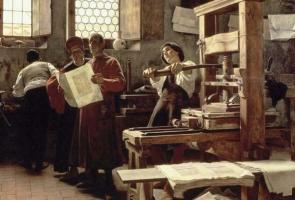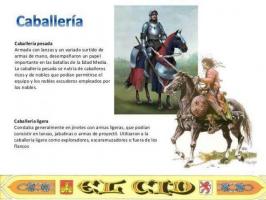What is medieval PHILOSOPHY
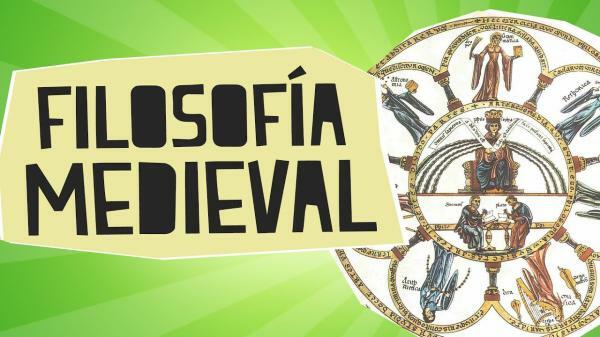
Image: Youtube
In a PROFESSOR we offer you a short summary of the medieval philosophy that takes place in Europe and the Middle East and that goes from the fall of the Roman Empire to the Renaissance. Medieval philosophy constitutes a mixture of Christian, Jewish, and Islamic doctrines and philosophy inherited from classical antiquity, such as the incarnation and the trinity. The philosophy of Plato, Aristotle or Plotinus, were of great influence in the development of medieval philosophy, thanks mainly to Tertullian, Ambrose, Boecio, Cicero and Seneca. Aristotle's texts reached Western Europe thanks to philosophers such as Averroes and Avicenna. If you want to know more about medieval philosophy, continue reading this article.
Index
- Stages of medieval philosophy
- The Patristics within medieval philosophy
- Islamic philosophy
- Jewish philosophy
- Scholastica
- Fundamental themes throughout medieval philosophy
- Arguments to prove the existence of God
Stages of medieval philosophy.
In this summary of medieval philosophy we will begin by detecting the two different periods, namely:
1. Platonic period
During this period still there is no clear separation between philosophy and theologyto. The most representative authors of this stage are Agustín de Hipona, Boecio, Juan Escoto Erígena, Anselmo de Canterbury and Pedro Abelardo.
2. Aristotelian period
At this stage, the first universities are created, and philosophy is presented more systematized that during the previous period, and the scholasticism, is the dominant current. Philosophers such as Ramon Llull, Tomás de Aquino, Juan Duns Scoto, Guillermo de Ockham and Buenaventura de Fidanza stand out.
In this other lesson we will discover which are the maincharacteristics of medieval philosophy.

The Patristics within medieval philosophy.
Patristics is the Study of the Christianity of the Church Fathers, and goes from the end of primitive Christianity to the eighth century, and it is in this period where all Christian religious beliefs are generated. Its great diffusion causes the displacement of polytheistic religions and is accepted by a large part of the population.
Among the main representatives of the patristics, the following stand out: Mario Victorino, Boecio, Isidoro de Sevilla, San Agustín de Hipona and Juan Escoto Erígena.
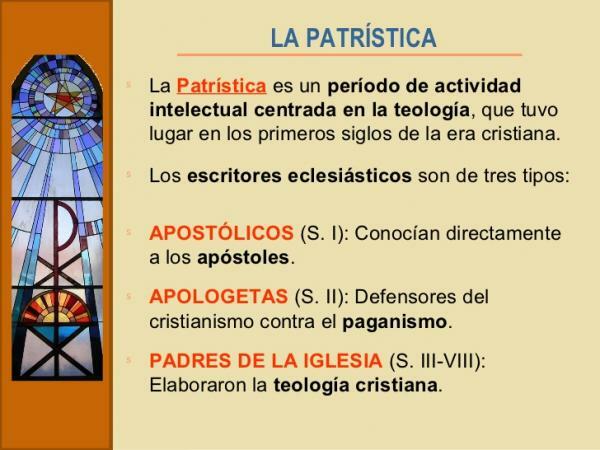
Image: Unmeasurable
Islamic philosophy.
Islamic philosophy is the set of doctrines related to the Islamic world, and constitutes a combination of Neoplatonism and Aristotelianism with doctrines of Islam. Authors such as al-Kindi, al-Farabi, Avicenna, Ibn Tufail and Averroes, who would make an interpretation of Aristotle's philosophy, later collected by Jewish and Christian thinkers.
Jewish philosophy.
It makes an introduction to Aristotelian logic, offering a clear and precise definition of the main syllogistic terms it uses. Philosophers such as Maimonides, highly influenced by the Arab, Al-Farabi stand out.
The Guide for the Perplexed, from Maimonides, shows that there can be no contradiction between faith and reason, since the first is based on revelation, and the second, the knowledge derived from Diso. It would soon be known to Christian philosophers as Albert the Great or Thomas Aquinas.
Image source: Slideshare
The Scholastica.
In this summary of medieval philosophy we cannot stop talking about the scholastics. The scholasticismmeans "he who belongs to the school", and is a theological and philosophical current, which gathers part of the classical Greco-Latin tradition and whose central theme is that of revelation, and is the mainstream of medieval philosophy, along with patristics, which focused on the question of the relationship between reason and faith.
It does not constitute a homogeneous set of currents, but rather includes different philosophies, such as the classical, the Arab or the Jewish. They argued that reason should submit to principle of authority, and all sources of knowledge were in the biblical texts, but at the same time, builds a logical system and a strongly structured discourse scheme.
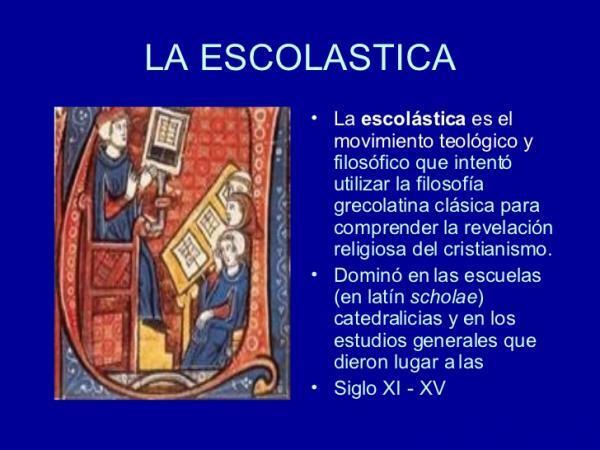
Fundamental themes throughout medieval philosophy.
In order to better understand medieval philosophy, it is important that we know what the central issues of this philosophy. The following stand out:
- The relationship between reason and faith
- The existence of God and his attributes
- Evil
- The free will
- Causality
- The limits of knowledge
- The substance problem
- Aristotelian logic
The fundamental theme of philosophy is God and the relationship between reason and faith, and no longer the human being, society or nature. Philosophy becomes an instrument of faith, its servant, remaining subordinate to it.
Medieval philosophy is inseparable from Christian philosophy, influenced in turn by Islamic and Judeo-Islamic philosophy and the texts by Arab philosophers such as Al-Kindi, Al-Farabi, Alhazen, Avicenna, Al-Ghazali, Avempace and Averroes, or Jews such as Maimonides and Gershonides.
Arguments to prove the existence of God.
The cosmological argument of Thomas Aquinas To demonstrate the existence of God, part of the fact that everything that exists has a cause, there must therefore be a first cause of everything, which is God, which is equivalent to Aristotle's first motor. The Five Ways of Demonstration existence of god, the philosopher exposes them in his "Theological Sum":
- First. Via del mmovement: everything that moves is moved by another, and since an infinite series of causes is not possible, it must be concluded that there is a first immobile motor, which would be God.
- Second. Via de la efiction: there are efficient causes that cannot be the cause of themselves, and since an infinite series of efficient causes is impossible, there must be a first uncaused efficient cause, which is God.
- Third. Vía Of the Contingency: there are beings that are not necessary, so a first necessary being must do, since an infinite causal series of contingent beings is not possible, which is God.
- Quarter. Via de los gdegrees of perfection: there are different degrees of perfection in nature, which implies the existence of a supreme being, absolutely perfect, which is God.
- Fifth. Vía of the ffinality: all natural beings are directed to an end, and therefore must be directed by an intelligent being, which is God.
The ontological argument of Anselm of Canterbury It is another important attempt to demonstrate the existence of God, and it can be summarized as follows: God is the maximum that can be thought, not being possible to think of something greater than him. This argument was later used by authors such asDuns Scoto or Discards.
If you want to read more articles similar to Medieval philosophy: short summary, we recommend that you enter our category of Philosophy.
Bibliography
Rafael Ramón Guerrero (1996). Medieval filosophy's history. Madrid: Akal Editions

